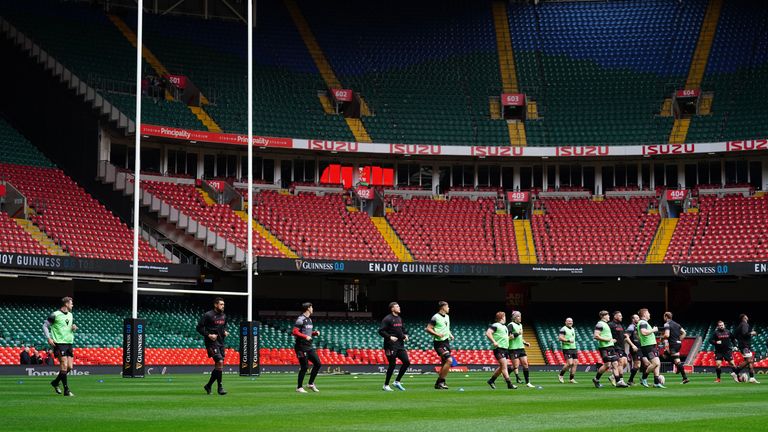Welsh Rugby Union member clubs vote in favour of major governance reforms
Interim chief executive Nigel Walker described the vote as the "beginning of a journey" to bring "trust and faith" back to Welsh Rugby; the Welsh Rugby Union will now appoint an independent non-executive director as chair
Sunday 26 March 2023 17:57, UK
Welsh Rugby Union member clubs voted overwhelmingly in favour of major governance reforms at an extraordinary general meeting on Sunday.
Of the 252 votes cast either at the Princess Royal Theatre in Port Talbot or by proxy, only seven did not vote in favour, meaning the 75 per cent majority needed was comfortably exceeded.
The WRU will now appoint an independent non-executive director (INED) as chair and recruit two further new INEDs to its 12-person board, doubling the total number of independent representatives to six, with the overall aspiration to ensure at least five directors are women.
Interim chief executive Nigel Walker said: "This is just the beginning of a journey which will see the trust and faith of a nation in Welsh rugby restored and revitalised."
The meeting was chaired by WRU president Gerald Davies who called it 'quorate' well ahead of an 11am start, with the 95-attendee threshold (to make any vote valid) also easily met.
The EGM also heard from WRU chair Ieuan Evans, chair of the WRU's community game board John Manders and Walker, with company secretary Rhodri Lewis overseeing proceedings alongside independent scrutineer Jonathan Rhodes.
"I'm delighted with the support members have shown for the board's recommendation today," said Evans, who set out his stated mission to modernise the governance of the WRU in his New Year address at the start of 2023, just a few weeks after his own election.
"We now have a line in the sand from which we intend to move forward purposefully, swiftly and better prepared to serve Welsh rugby's needs. This is another historic day in the 142-year history of the WRU.
"Members have taken the opportunity to pay something forward of huge significance to our great rugby-playing country's children… and its children's children."
In the new configuration, four board members will still come from the WRU council which is entirely elected by member clubs, one of whom will be the community game board's chair.
The remaining two spots on the board will be filled by the WRU CEO and a new director role for someone who can support and further the women's game.
All changes will take place in context of the overall aspiration to ensure at least five directors are women.
The annual general meeting of the WRU, which will see a natural changing of the guard for a number of WRU council members takes place in November, and the WRU has already planned a timeline for appointments, with the new chair to come in first and the following processes to be completed before the end of 2023.
Anaylsis: An extraordinary moment, but still a long way to go
Sky Sports News' Geraint Hughes:
To say all the ills which have engulfed the WRU have been eradicated by a momentous vote in favour of radical reform would be wrong. There is still a very long way to go for Welsh rugby to truly say and believe itself to be an inclusive and welcoming environment for all to work and play in.
However, as change goes from a major sporting organisation, this is a big deal which many other sports governing bodies - from football to gymnastics - grappling with change will look at.
The current chair and chief executive have now made their jobs redundant; they've pleaded with the 282 member clubs of the WRU to do that and it's happened, which is extraordinary. While Ieuan Evans and Nigel Walker have made that ambition reality through a hard sell, they doubtless know even harder work lies ahead to bring about the changes that were so overwhelmingly voted for at the EGM.
A new chair, a new chief executive, one of whom must be female. A 12-strong board, six to be independent non-executive roles, with an aspiration to appoint at least five women to the overall board. Plus, an overhaul of the culture within not just the WRU, but Welsh rugby as a whole.
How often do we hear the phrase: "We must become more inclusive, more diverse and be a game for all"? Talk can be cheap. Enough people within the WRU know that a viable and bright future for the game involves engaging with 51 per cent of the Welsh population - girls and women - in a far better way than it has ever done.
Sponsors and therefore money is at stake if they don't, and a government is watching intently. Better engagement with communities not traditionally associated with rugby is also required, or more to the point the good people on the ground doing that work need greater help and recognition.
Most observers thought the WRU would just about succeed in reaching the 75 per cent vote threshold, but that it would be close. Not many dreamt of a 97.2 per cent mandate.
Perhaps credit must also go to the majority of Wales' 282 member clubs - not only did they vote for radical reform of their hierarchy, but asked for help at a local level to help them better reflect how they want their game to evolve.
Change or potential extinction was the message before this vote. Sense prevailed.



